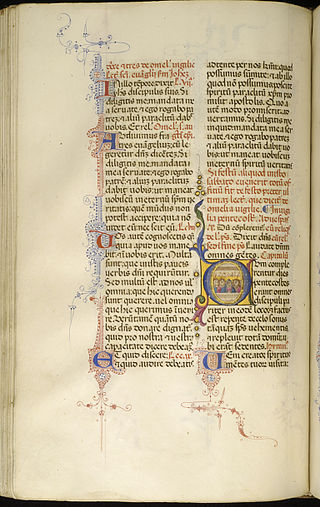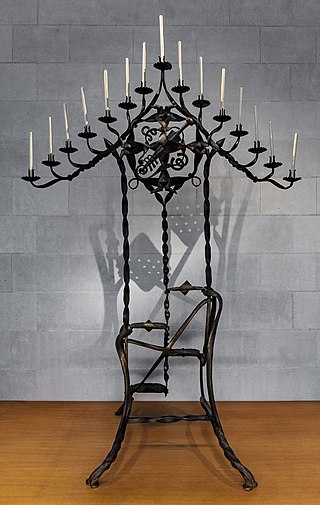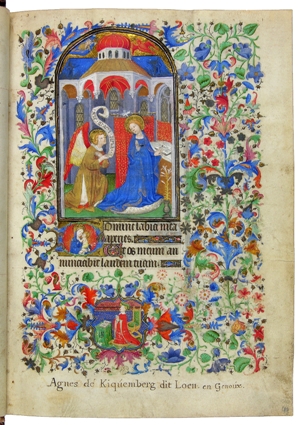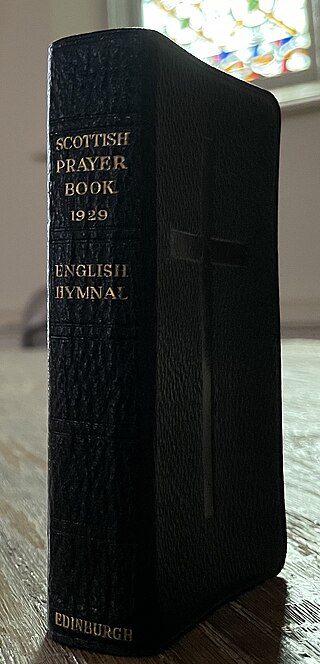
The Roman Breviary is a breviary of the Roman Rite in the Catholic Church. A liturgical book, it contains public or canonical prayers, hymns, the Psalms, readings, and notations for everyday use, especially by bishops, priests, and deacons in the Divine Office.

An antiphon is a short chant in Christian ritual, sung as a refrain. The texts of antiphons are usually taken from the Psalms or Scripture, but may also be freely composed. Their form was favored by St Ambrose and they feature prominently in Ambrosian chant, but they are used widely in Gregorian chant as well. They may be used during Mass, for the Introit, the Offertory or the Communion. They may also be used in the Liturgy of the Hours, typically for Lauds or Vespers.

Vespers is a liturgy of evening prayer, one of the canonical hours in Catholic, Eastern Orthodox, Oriental Orthodox, and Lutheran liturgies. The word for this prayer time comes from the Latin vesper, meaning "evening".

In the practice of Christianity, canonical hours mark the divisions of the day in terms of fixed times of prayer at regular intervals. A book of hours, chiefly a breviary, normally contains a version of, or selection from, such prayers.
A memorial in the Roman Rite of the Catholic Church is a lower-ranked feast day in honour of a saint, the dedication of a church, or a mystery of the religion.

Matins is a canonical hour in Christian liturgy, originally sung during the darkness of early morning.

Lauds is a canonical hour of the Divine office. In the Roman Rite Liturgy of the Hours it is one of the major hours, usually held after Matins, in the early morning hours.

Tenebrae is a religious service of Western Christianity held during the three days preceding Easter Day, and characterized by gradual extinguishing of candles, and by a "strepitus" or "loud noise" taking place in total darkness near the end of the service.

The Liturgy of the Hours, Divine Office, or Opus Dei are a set of Catholic prayers comprising the canonical hours, often also referred to as the breviary, of the Latin Church. The Liturgy of the Hours forms the official set of prayers "marking the hours of each day and sanctifying the day with prayer." The term "Liturgy of the Hours" has been retroactively applied to the practices of saying the canonical hours in both the Christian East and West–particularly within the Latin liturgical rites–prior to the Second Vatican Council, and is the official term for the canonical hours promulgated for usage by the Latin Church in 1971. Before 1971, the official form for the Latin Church was the Breviarium Romanum, first published in 1568 with major editions through 1962.

The Office of the Dead or Office for the Dead is a prayer cycle of the Canonical Hours in the Catholic Church, Anglican Church and Lutheran Church, said for the repose of the soul of a decedent. It is the proper reading on All Souls' Day for all departed souls (Purgatory), and can be a votive office on other days when said for a particular decedent. The work is composed of different psalms, scripture, prayers and other parts, divided into The Office of Readings, Lauds, Daytime Prayer, Vespers and Compline.
Prime, or the First Hour, is one of the canonical hours of the Divine Office, said at the first hour of daylight, between the dawn hour of Lauds and the 9 a.m. hour of Terce. It remains part of the Christian liturgies of Eastern Christianity, but suppressed within the Latin liturgical rites by the Second Vatican Council. In the Coptic Church, a denomination of Oriental Orthodox Christianity, the office of Prime is prayed at 6 am in eastward direction of prayer by all members in this denomination, both clergy and laity, being one of the seven fixed prayer times. Latin Catholic clergy under obligation to celebrate the Liturgy of the Hours may still fulfil their obligation by using the edition of the Roman Breviary promulgated by Pope John XXIII in 1962, which contains Prime. Like all the liturgical hours, except the Office of Readings, it consists mainly of Psalms. It is one of the Little Hours.

Nocturns is a Christian canonical hour said in the nighttime.
The Little Office of the Blessed Virgin Mary, also known as Hours of the Virgin, is a liturgical devotion to the Blessed Virgin Mary, in imitation of, and usually in addition to, the Divine Office in the Catholic Church. It is a cycle of psalms, hymns, scripture and other readings.
The reform of the Roman Breviary by Pope Pius X was promulgated by that Pope with the apostolic constitution Divino afflatu of 1 November 1911.

The liturgical books of the Roman Rite are the official books containing the words to be recited and the actions to be performed in the celebration of Catholic liturgy as done in Rome. The Roman Rite of the Latin or Western Church of the Catholic Church is the most widely celebrated of the scores of Catholic liturgical rites. The titles of some of these books contain the adjective "Roman", e.g. the "Roman Missal", to distinguish them from the liturgical books for the other rites of the Church.
The Little Office of the Passion refers to a devotional office created by Francis of Assisi as a complement to the Divine Office of the Roman Catholic Church.

A breviary is a liturgical book used in Christianity for praying the canonical hours, usually recited at seven fixed prayer times.
The Daily Office is a term used primarily by members of the Episcopal Church. In Anglican churches, the traditional canonical hours of daily services include Morning Prayer and Evening Prayer, usually following the Book of Common Prayer. As in other Christian traditions, either clergy or laity can lead the daily office. Most Anglican clergy are required to pray Morning and Evening Prayer daily.

Primer is the name for a variety of devotional prayer books that originated among educated medieval laity in the 14th century, particularly in England. While the contents of primers have varied dependent on edition, they often contained portions of the Psalms and Latin liturgical practices such as the Little Office of the Blessed Virgin Mary. Medieval primers were often similar to and sometimes considered synonymous with the also popular book of hours ; typically, a medieval horae was referred to as a primer in Middle English.

The 1929 Scottish Prayer Book is an official liturgical book of the Scotland-based Scottish Episcopal Church. The 1929 edition follows from the same tradition of other versions of the Book of Common Prayer used by the churches within the Anglican Communion and Anglicanism generally, with the unique liturgical tradition of Scottish Anglicanism. It contains both the forms of the Eucharistic liturgy and Daily Office, as well as additional public liturgies and personal devotions. The second major revision of the Book of Common Prayer following the full independence of the Scottish Episcopal Church, the 1929 Scottish Prayer Book succeeded the 1912 edition and was intended to serve alongside the Church of England's 1662 prayer book.













